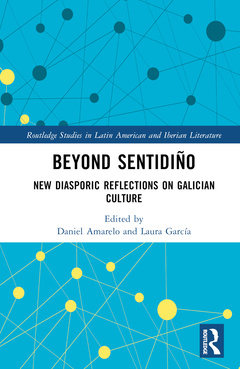Description
Beyond sentidiño
New Diasporic Reflections on Galician Culture
Routledge Studies in Latin American and Iberian Literature Series
Coordinators: Amarelo Daniel, Lesta García Laura
Language: English
Subjects for Beyond sentidiño:
Keywords
Latin American; migration; sentidiño; Galiza Diaspora; Galician
· 15.2x22.9 cm · Hardback
Description
/li>Contents
/li>Readership
/li>Biography
/li>
Beyond Sentidiño: New Diasporic Reflections on Galician Culture is an interdisciplinary study of Galician literature, languages, and cultures. The volume brings together essays from fields across the humanities and social sciences to foster a discussion that incorporates new concepts that, as of now, are not part of the imaginary of Galiza: gentrification, language imperialism, youth unemployment, deruralization and deindustrialization, media control, technocapitalism, and gender and sexual normativity. It also serves to moderate a conversation about how the independence from the political, material, and sociocultural networks of Autonomic Galiza allows diasporic scholars to think of Galician culture in a desessentializing manner. Working and living in the diaspora provides a lens through which to unmask the hegemonic neocolonial and neoliberal representation and reproduction of Galicianness promoted by different social, political, and mediatic powers.
List of contributors
Acknowledgments
Introduction
1. An introd-action to contemporary Galician culture: Publics, critics, challenges
Laura Lesta García (Middlebury College) and Daniel Amarelo (Universitat Oberta de Catalunya)
Part I. Beyond Stasis: Galicianness on the Move
2. Songs of migration: Towards a poetics of (un)happiness in Galician pop music (1969-1980)
David Miranda-Barreiro (Bangor University)
3. Galicia sitio distinto?: Music in Galicia during the Transition
Alicia Pajón Fernández (Universidad de Oviedo)
4. Así fai o quen ben baila: Galician dance and cultural identity
Kalee Rose Prendergast (Universidade Nova de Lisboa)
Part II. Beyond the Tradition: New Normativities, Old Resistances
5. Queering the nation: Alternative sexual identities in contemporary Galician cinema
José Colmeiro (University of Auckland)
6. Ethnographic elegies of resistance in current Galician literature: Emilio Araúxo’s Seica Si and Mal Mor
Miriam Sánchez Moreiras (Independent Scholar)
Part III. Beyond the Border: Bridges, Contacts, Cross-fertilizations
7. Teaching Galician in North American Higher Education
Laura Lesta García (Middlebury College)
8. Galician, a language into Lusophony?
Xoán Carlos Lagares (Universidade Federal Fluminense)
9. Galician World Literature? Born-translated fiction and the construction of Galician culture in English
Laura Linares (University of Limerick)
Part IV. Beyond Institutionality: Uploading the Future
10. Imagining Galicia: Identity politics, cultural practices, and a covering over some other thing
Paula Godinho (Universidade Nova de Lisboa)
11. Politics and culture in contemporary Galiza: Xacobeo 2021-22
Cristina Martínez Tejero (Universidade de Santiago de Compostela)
12. Memesphere as a counterpublic: Fake Instagram accounts of Galician City Councils and the contestation of institutional understandings of community
Daniel Amarelo (Universitat Oberta de Catalunya)
Afterword
13. Dirty hands: Old through new, and the collateral effects of overexposure in the cultural context of non-urban Galicia
Ángel Calvo Ulloa (Curator and art critic)
Index
Daniel Amarelo is a PhD student in Humanities and Communication (Critical Sociolinguistics) at the Universitat Oberta de Catalunya, and a member of the Galician Network of Queer Studies (RGEQ). Their thesis studies Galician and Catalan queer speakers’ linguistic ideologies regarding the intersection of language, nation, and sexuality.
Laura Lesta García is an Assistant Professor of Luso-Hispanic Studies at Middlebury College (Vermont, USA). Her research addresses the intersection between humor and history and its role in the processes of national and identity formation in the Iberian Peninsula, especially in Galicia. Professor Lesta García has published in venues such as Bulletin of Hispanic Studies and Romance Notes. She is working on her first monograph about humor, history, and identity in Galicia.




